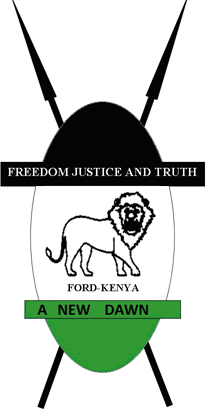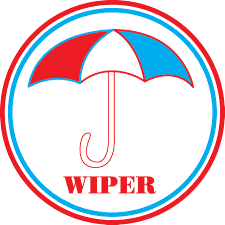
The Kenya African National Union (KANU) is a Kenyan political party that ruled for nearly 40 years after Kenya's independence from British colonial rule in 1963 until its electoral loss in 2002. It was known as Kenya African Union (KAU) from 1944 but due to pressure from the colonial government, KAU changed its name to Kenya African Study Union (KASU) mainly because all political parties were banned in 1939 following the start of the Second World War. In 1946 KASU rebranded itself into KAU following the resignation of Harry Thuku as president due to internal differences between the moderates who wanted peaceful negotiations and the militants who wanted to use force, the latter forming the Aanake a forty, which later became the Mau Mau. His post was then occupied by James Gichuru, who stepped down for Jomo Kenyatta in 1947 as president of KAU. The KAU was banned by the colonial government from 1952 to 1960. It was re-established by James Gichuru in 1960 and renamed KANU on 14 May 1960 after a merger with Tom Mboya's Kenya Independence Movement.

Stephen Kalonzo Musyoka is a Kenyan politician who was the tenth Vice-President of Kenya from 2008 to 2013. Musyoka served in the government under the late President Daniel arap Moi as the Secretary of Kenya African National Union party (1980-1988), Assistant Minister for Works (1986-1988), Deputy Speaker of the National Assembly (1988-1992), Minister for Foreign Affairs from 1993 until 1998, Minister of Education (1998-2001); and subsequently, under the late President Mwai Kibaki, he was Minister of Foreign Affairs again from 2003 to 2004, then Minister of the Environment from 2004 to 2005. He was an unsuccessful candidate in the 2007 presidential election, after which he was appointed vice-president by Kibaki in January 2008.

Wangarĩ Maathai was a Kenyan social, environmental, and political activist who founded the Green Belt Movement, an environmental non-governmental organization focused on the planting of trees, environmental conservation, and women's rights. In 2004 she became the first African woman to win the Nobel Peace Prize.

Forum for the Restoration of Democracy–Kenya (FORD–Kenya) is a Kenyan political party. The party has sat in the government of Kenya once, under the National Rainbow Coalition, from 2003 to 2007, having ended forty years of one party rule. In April 2022, the party joined the Kenya Kwanza coalition for the August 2022 elections, and is headed by Moses Wetangula, the current speaker of the National Assembly of Kenya. The party tends to be more popular among the Luhya people.

David (Daudi) Mwiraria was the Minister for Environment and Natural Resources and previously Finance Minister of Kenya until December 2007 when Kenya held its General Elections. Running for re election on a Party of National Unity ticket, defending his seat as Member of parliament for North Imenti Constituency, he was defeated by Silas Muriuki, who was running on a Mazingira Green Party of Kenya ticket.
Kiraitu Murungi is a Commissioner at the Kenya Law Reform Commission and the former governor of Meru County in Kenya. He is a former long-serving member of parliament for South Imenti constituency (1992-2013), former cabinet minister, and former senator for Meru County.
The Orange Democratic Movement (ODM) is a centre-left political party in Kenya. It is the successor of a grassroots people's movement that was formed during the 2005 Kenyan constitutional referendum campaign. This movement separated in August 2007 into the Orange Democratic Movement Party of Kenya and the Wiper Democratic Movement – Kenya.

The National Rainbow Coalition–Kenya (NARC–Kenya) is a political party in Kenya. The party was formed after the defeat of the government-sponsored draft constitution. It was formed by National Rainbow Coalition members loyal to the government. The party, though months old, captured 3 parliamentary seats and 2 Civic seats in the by-elections of 24 July 2006 that was seen as a litmus test for the upcoming general elections for which the new party was planned to play a major role in securing reelection for president Mwai Kibaki.

The Wiper Democratic Movement–Kenya (WDM-K), formerly Orange Democratic Movement–Kenya (ODM–Kenya), is a political party in Kenya, which originated as a result of the 2005 Kenyan constitutional referendum. The party tends to be more popular among the Kamba people. It is headed by Kalonzo Musyoka, who ran for president in 2007 and served as the vice-president in the Grand Coalition of Mwai Kibaki and Raila Odinga. He is now a member of the main opposition Azimio La Umoja One Kenya Party.
Makadara Constituency is an electoral constituency in Nairobi City County, Kenya. It is one of the seventeen constituencies in the county. It was renamed prior to the 1997 elections, but was also known as Nairobi Doonholm Constituency for the 1963 elections, then as Bahati Constituency from 1966 to 1997. It consists of some central and southern of central areas of Nairobi County. The entire constituency is located within Nairobi City County, and has an area of 13 km2. The current constituency boundaries were revised prior to the 2013 elections. It has a population of 189,536 people from the 2019 census report.
Starehe is an electoral constituency in Kenya. It is one of seventeen constituencies in Nairobi City County, consisting of central and central to north areas of Nairobi. The constituency was established for the 1966 elections, with an area of 20 km2 (7.7 sq mi). It borders Westlands Constituency to the north; Mathare Constituency to the northeast; Kamukunji and Makadara constituencies to the east; Embakasi South Constituency to the south; Dagoretti North, Kibra and Lang'ata constituencies to the west.
Tetu Constituency is an electoral constituency in Kenya. It was established in 1988 and is one of the six constituencies in Nyeri County.

The Party of National Unity (PNU) is a political party in Kenya originally founded as a political coalition. On 16 September 2007, Kenyan President Mwai Kibaki announced the party's formation and declared that he would run as its presidential candidate in the December 2007 Kenyan elections. Following the conditions set by the Political Parties Act which were passed in Kenya in 2008, PNU became an official political party. Recently PNU has launched activities to revamp itself ahead of the 2022 general elections.
This article contains detailed results of the parliamentary election that was held as part of the Kenyan general election in December 2007. Those elected sat in the 10th Parliament of Kenya.

General elections were held in Kenya on 27 December 2007. Voters elected the President, and members of the National Assembly. They coincided with the 2007 Kenyan local elections.
The 10th Parliament of Kenya saw the National Assembly opened on 15 January 2008. This following the Orange Democratic Movement (ODM) of Raila Odinga winning a majority in the 2007 parliamentary elections. Raila was a candidate in the presidential elections, which resulted in a controversial victory for Mwai Kibaki of the Party of National Unity. The opening of the parliament was fraught with jeers, cheers and brawls between the opposing parties; Mwai Kibaki was greeted by the ODM members with silence and boos, while Raila was greeted by PNU members with accusations of genocide.
Kipkalya Kiprono Kones was a Kenyan politician who served as a minister during the 1990s and was briefly Minister of Roads in 2008. He was a member of the National Assembly of Kenya from 1988 to 2008.
Esther Murugi Mathenge is a Kenyan politician. She is a former Member of Parliament for Nyeri Town Constituency in the National Assembly of Kenya.
A list of happenings in 2011 in Kenya:

The National Alliance (TNA) was a political party in Kenya. It took on its current identity when Uhuru Kenyatta assumed control and renamed it as the vehicle for his 2012 presidential campaign.









